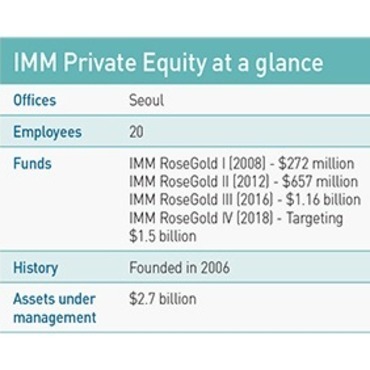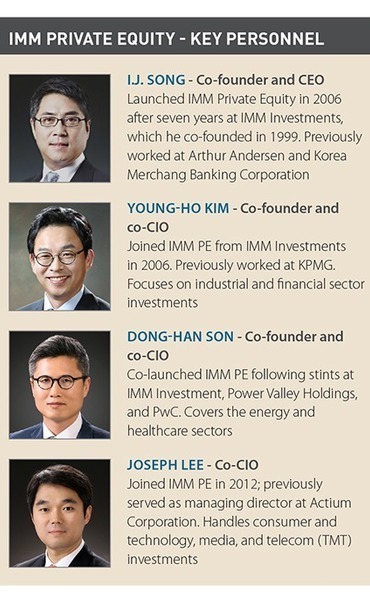
GP profile: IMM Private Equity

As one of oldest GPs in South Korea, IMM Private Equity has helped to show both domestic and global investors that the PE community can bring major benefits to the country’s corporate sector
Tailim Packaging Group seemed to be a company headed for trouble. In a world of rapid technological progression, the 40-year-old Korean cardboard box maker was stuck with an antiquated business model centered around an aging founder with no clear successor. While the company still maintained a leadership position in the packaging industry, revenue was stagnating. Tailim posted a net loss in 2015, the same year that IMM Private Equity acquired it for KRW350 billion ($300 million).
The GP saw Tailim as exactly the kind of opportunity it should be pursuing. Despite the recent slowdown, the company had a solid foundation and was in an industry with overlooked growth potential. IMM believed that by putting the right people and systems in place and building up relationships in key adjacent industries, it could reinvigorate the business.
"E-commerce was growing, but we wanted to see what other industries were growing with it – and everything gets delivered in a box," says Joseph Lee, a partner and co-CIO at the firm. "The company was run by a gentleman in his 80s who was looking to retire, so he sold to us, and in only three years we've quadrupled EBITDA to around $160 million, all through operational improvements."
For Lee and his colleagues, Tailim shows how IMM has matured from its early days just over a decade ago, when the GP mainly focused on chaebol restructuring deals. Today, with 30 investments and 21 full or partial exits under its belt, IMM is eying a far wider range of opportunities in the buyout and growth equity market where it can bring its experience and skill set to bear.
Son of Song
IMM PE was the brainchild of I.J. Song, a former accountant with Arthur Andersen in Seoul and an investment banker with Korean Merchant Banking Corporation. Song founded IMM's predecessor, IMM Investment, in 1999 with a broad mandate: along with supporting Korea's nascent start-up ecosystem through venture capital investments, the firm would also provide growth equity to small and medium-sized enterprises (SME) and mezzanine financing for corporate restructuring opportunities.
It didn't take long after IMM Investment's establishment for Song to spot an even bigger opportunity. In the fallout from the Asian financial crisis, the conglomerates that underpinned Korea's economy were under pressure. They had sunk considerable capital over the years into non-core assets that now threatened to become a drag on their balance sheets. Facing mounting calls from both shareholders and policy makers to streamline their operations, the conglomerates were open to any opportunities to slim down.
"As Korea's economy was developing, diversification was considered critical and every company wanted to play in every industry," says Young-Ho Kim, who worked with Song at IMM Investment and joined him to co-found IMM PE in 2006. "But as the tide shifted to focus on their core businesses, the Korean government started pushing companies to sell their non-core assets as well. Private equity firms like ours can be a useful partner in that process."

The firm would eventually raise more than 10 of these funds, which stood it well when regulators introduced a traditional PE framework. IMM Investment had built up a respectable track record with chaebol restructuring, but Song felt he could make a bigger impact with a firm focused solely on buyout and growth investments. Along with Kim and Dong-Han Son, another colleague from IMM Investment, Song set up IMM Private Equity in 2006.
"Before 2005, there were no homegrown Korean private equity firms. Goldman Sachs, Carlyle, Lone Star, and other foreign investment funds were the only players in the market," Song says. "But after the new regulations came out, there was an opportunity for local firms such as IMM that had significant experience with SME investments and corporate restructuring."
IMM PE's debut fund, IMM RoseGold I, which launched in 2006, marked a refined approach. The project fund model had allowed Song and his co-founders to pursue a range of strategies – one transaction could require growth equity alone, another might involve debt financing, and IMM had even dabbled in non-performing loans. For the first RoseGold vehicle, which would close at $272 million in 2008, IMM focused on growth investments in chaebol spinoffs that passed under the radar of their overseas competitors.
"The biggest deals were done by the large global funds, but there were a lot of deals happening during and after the Asian financial crisis in the mid to large-cap space, under $1 billion in valuation," says Lee. "We had put together a track record doing those deals, so that when the National Pension Service was looking to seed the first generation of Korean private equity players, we were able to get the nod from them and other Korean LPs."
Doosan Defense Systems & Technology (DST) provided an early test for IMM. It firm acquired a 49% stake in the arms manufacturer in 2009, along with Mirae Asset Private Equity, from Doosan Group, with the PE investors collectively committing KRW215.6 billion.
Doosan DST provides a demonstration of IMM's approach in its early days. Though the firm would come to put a greater emphasis on control deals, only one of the five portfolio companies in RoseGold I involved the acquisition of a majority stake. For the rest, like Doosan DST, it focused on supporting the majority shareholder's growth initiatives until Hanwha Techwin bought the business for KRW695 billion in 2016.
"In those situations, you can often have a better outcome if you approach it as a partner rather than as someone looking for the best price," says Song. "So we went in as minority investors, took a 49% stake and worked with the company on operational improvements, and eventually sold to another chaebol, in one of our most successful early exits."
Strategic evolution
Handok, a pharmaceutical developer backed from RoseGold II – which closed at $657 million in 2012 – shows how the minority strategy has evolved. Ahead of this deal, which saw the firm acquire a 30% stake from German pharmaceutical company Sanofi for $49 million in 2012, it was agreed with the family of founder Shin-Kwon Kim that IMM would focus on sourcing and executing inorganic growth opportunities while the Kim family grew the core business. The GP went on to lead the bolt-on of rival Genexine in 2014 before exiting Handok on the public market last year for a 2x return.
This arrangement has come to typify the way that IMM approaches minority transactions. Not only does a clear delineation of responsibilities allow both parties to work more efficiently, it also makes it clear to the portfolio company that IMM is a strategic partner, not just a source of capital.
"We would not have been able to source that deal privately and go in at a good entry valuation if we didn't have the operational value-add capability," says Lee. "If it's just money that we're bringing, then the banks and mezzanine funds in Korea would be more than happy to lend to these companies. It's only when we have that operational angle that we're able to go into these growth capital deals on a private basis."
In more recent funds, IMM has moved to emphasize its abilities as a control investor. About half of the deals in RoseGold II involved majority stakes; the same ratio held for RoseGold III – closed at $1.16 billion in 2016 – and is expected to continue for RoseGold IV, which launched last year and has raised about $1 billion toward its $1.5 billion target.
IMM's team has grown along with its fund sizes. Today the firm employs 24 investment professionals led by Kim, Son and Lee as co-CIOs. Each focuses on different sectors: Kim handles industrial and financial services, Son covers energy and healthcare, and Lee oversees the consumer and technology, media, and telecom (TMT). The investment committee comprises the founding partners and Lee.
Team members are expected to take an active role driving growth in portfolio companies. IMM has a secondment policy, with all team members involved in a control deal required to work directly with the portfolio company for three to six months. In this way the firm can confirm firsthand where the company's greatest strengths and weaknesses lie, as well as give team members a sense of ownership of the company.
The program started with the second fund and IMM feels it has been a key differentiator for the GP – so much so that its impact has been felt throughout the PE ecosystem. "This kind of secondment was unknown in Korean private equity before we started our program, but after IMM adopted this approach our competitors started to pursue it as well," Kim notes.
Once this initial stage is finished, IMM creates an action plan covering all areas of improvement identified by the deal team. Typically, the firm avoids distressed or turnaround deals, or other situations where drastic action is required, preferring companies with fundamentally sound business models that just need adjustments.
Hollys Coffee, acquired in 2013 for $87.5 million, is a case in point. The company had done solid business in Korea's booming coffeehouse market, but its growth had lagged behind domestic rivals like Caffe Bene and foreign players such as Starbucks. IMM has helped the chain triple revenue and EBITDA over the last five years through a push to capture the youth market; today Hollys is Korea's fastest-growing coffeehouse chain.
One of the biggest benefits that IMM touts is its ability to attract new management talent to its portfolio companies. In this respect the firm's focus on Korea is an advantage because chaebols tend to push out managers of subsidiaries at a relatively young age. Thanks to this pool of readily available talent, domestic GPs so far haven't needed to create stables of in-house executives as seen in other markets.
"We do think about whether we need a standing army, but at this point it's a bit early for the Korean market," says Lee. "There is a strong bench of chaebol-trained, C-level management talent in Korea that we can tap into – a lot of the current CEOs in our portfolio companies and people who've helped us on diligence are from this network."
Broad scope
As IMM grows it plans to keep its focus broad, with both control and growth equity deals given equal weight in future funds. The firm believes that as a country-focused GP it needs to consider any opportunities that emerge. It expects to keep its options open sector-wise as well, with its portfolio representing interests from shipbuilding to cosmetics.
IMM's history of strong exits has also captured the attention of international investors. While its first fund – and the project funds that preceded it – were raised entirely from Korean LPs, overseas investors have played a growing role in subsequent vehicles and are expected to account for up to a third of commitments to Fund IV. The firm hopes its performance, and that of its peers, will prove to the global investor community that Korea's private equity industry is here to stay.
"Korea is a market where operational improvements work," Lee says. "Through the 12 full exits we've done so far, 65% of our value creation was through operational improvements. And we're not the only ones – a lot of good GPs in Korea have shown that operational improvements can happen very consistently here."

Latest News
Asian GPs slow implementation of ESG policies - survey
Asia-based private equity firms are assigning more dedicated resources to environment, social, and governance (ESG) programmes, but policy changes have slowed in the past 12 months, in part due to concerns raised internally and by LPs, according to a...
Singapore fintech start-up LXA gets $10m seed round
New Enterprise Associates (NEA) has led a USD 10m seed round for Singapore’s LXA, a financial technology start-up launched by a former Asia senior executive at The Blackstone Group.
India's InCred announces $60m round, claims unicorn status
Indian non-bank lender InCred Financial Services said it has received INR 5bn (USD 60m) at a valuation of at least USD 1bn from unnamed investors including “a global private equity fund.”
Insight leads $50m round for Australia's Roller
Insight Partners has led a USD 50m round for Australia’s Roller, a venue management software provider specializing in family fun parks.








